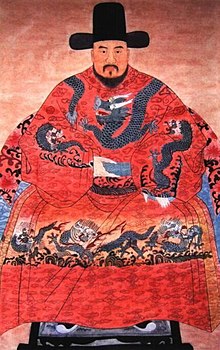| This article includes a list of general references, but it lacks sufficient corresponding inline citations. Please help to improve this article by introducing more precise citations. (August 2017) (Learn how and when to remove this message) |
| Gao Gong | |
|---|---|
 | |
| Senior Grand Secretary | |
| In office 1571–1572 | |
| Monarchs | Longqing Emperor Wanli Emperor |
| Preceded by | Li Chunfang |
| Succeeded by | Zhang Juzheng |
| Personal details | |
| Born | 19 January 1513 |
| Died | 4 August 1578(1578-08-04) (aged 65) |
Civil and honorary titles
| |
Gao Gong (Chinese: 高拱; pinyin: Gāo Gǒng; Wade–Giles: Kao Kung; 19 January 1513 – 4 August 1578) courtesy name Suqing (肅卿), art name Zhongxuan (中玄), was a Chinese politician of the Ming dynasty.
Gao was born in Xinzheng, Henan. He became jinshi in 1541, then held a post at Hanlin Academy. Since 1552, he served as tutor to the then heir apparent, later the Longqing Emperor for nine years, which made the emperor trust him fully. He served successively as Vice Minister of Rites, Vice Minister of Personnel, and Minister of Rites. In 1566, he was promoted to the Grand Secretariat of Wenyuan Chamber with recommendation from Xu Jie. After the enthronement of the Longqing Emperor, Gao's higher status catalyzed a sudden escalation of antagonism between Gao and Xu. Impeached by several censors, he was forced to retire in 1567. Zhang Juzheng did his utmost to persuade the emperor to recall Gao for political reasons. Thus, Gao returned to Beijing in 1569. He replaced Li Chunfang, the former Senior Grand Secretary, who was defeated in the political struggle by the death of the emperor. Zhang was hostile to him afterwards. The eunuchs in the Directorate of Ceremonial headed by Feng Bao brooked no weakening of their power by Gao. Hence, an alignment grew up between Zhang and Feng aimed at marginalizing Gao. They criticized Gao before Empress Dowager Xiaoding. Gao had to retire and return home once again. He finished the memoir Bingta yiyan (病榻遺言) in his later years. In 1578, Gao died at home.
Although Gao's term was quite brief, he made great efforts with Zhang to subsume Altan Khan's Tumed into the tributary system. Consequently, he was granted the Grand Preceptor as the posthumous title in 1602.
Notes
- Encyclopedia of China, Vol. 7 (2nd edition, 中国大百科全书(第二版)第7册). Encyclopedia of China Publishing House. 2009. p. 292. ISBN 978-7-500-07958-3.
References
- Mote, Twitchett (2007). The Cambridge History of China, Volume 7: The Ming Dynasty, 1368–1644, Part 1. Cambridge University Press. ISBN 978-0-521-24332-2.
- Twitchett, Mote, Denis, Frederick W. (1998). The Cambridge History of China, Volume 8: The Ming Dynasty, 1368–1644, Part 2. Cambridge University Press. ISBN 978-0-521-24333-9.
{{cite book}}: CS1 maint: multiple names: authors list (link)
| Political offices | ||
|---|---|---|
| Preceded byLi Chunfang | Senior Grand Secretary 1571–1572 |
Succeeded byZhang Juzheng |
| Senior grand secretaries of the Ming dynasty | |
|---|---|
| Yongle era |
|
| Hongxi and Xuande eras | |
| Zhengtong era | |
| Jingtai era | |
| Tianshun era |
|
| Chenghua era | |
| Hongzhi era | |
| Zhengde era | |
| Jiajing era | |
| Longqing era | |
| Wanli era | |
| Taichang era | |
| Tianqi era | |
| Chongzhen era | |
| Southern Ming regimes |
|
| Senior Grand Secretaries of the Prince of Lu (魯) regime | |